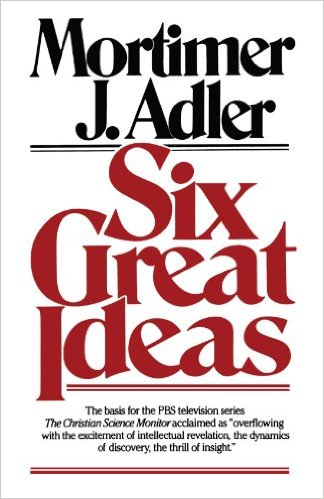|
home | what's new | other sites | contact | about |
|||
|
Word Gems exploring self-realization, sacred personhood, and full humanity
Dr. Mortimer J. Adler's Six Great Ideas
return to 'Six Great Ideas' main-page
... It cannot be too often repeated that philosophy is every- body's business. To be a human being is to be endowed with the proclivity to philosophize. To some degree we all engage in philosophical thought in the course of our daily lives.
Acknowledging this is not enough. It is also necessary to understand why this is so and what philosophy's business is.
The answer, in a word, is ideas. In two words, it is great Ideas - the ideas basic and indispensable to understanding ourselves, our society, and the world in which we live.
the great ideas constitute the vocabulary of thought These ideas, as we shall see presently, constitute the vocab- ulary of everyone's thought. Unlike the concepts of the special sciences, the words that name the great ideas are all of them words of ordinary, everyday speech. They are not technical terms. They do not belong to the private jargon of a specialized branch of knowledge. Everyone uses them in ordinary conver- sation. But everyone does not understand them as well as they can be understood, nor has everyone pondered sufficiently the questions raised by each of the great ideas. To do that and to think one's way through to some resolution of the conflicting answers to these questions is to philosophize.
This book aims to do no more than to provide some guidance in this process. Not for all of the great ideas; that would take a very long book indeed. But for six of them, six of obvious im- portance to all of us: truth, goodness, and beauty on the one hand; liberty, equality, and justice on the other.
I am not only limiting myself to the consideration of these six ideas. I am also limiting the consideration of them to an ele- mentary delineation of each idea that will try to achieve three results for the reader.
we constantly make judgments of 'true' and 'false' but on what basis do we make these decisions First, it should give the reader a surer grasp of the various meanings of the word he uses when he talks about the idea. In the course of any week, every one of us probably says "That's true" or "That's false" a dozen times. What do we mean when we say that? By what criteria do we make that judgment? And how can we support our judgment if the person we are talking to challenges us? Getting the idea of truth a littler clearer than it is for most people will help them to answer these questions. When they move, even a little, toward a better understanding of the idea of truth, they are, of course, philosophizing whether or not they consciously think of themselves as doing so.
Second, the delineation of each idea should make the reader more aware than he normally is of questions or issues that he cannot avoid confronting if he is willing to think a little further about the idea—basic ones, ones that human beings have been arguing about over the centuries.
'my truth and your truth' Does what is true change from time to time or is it immuta- ble? Can one thing be true for me and the very opposite true for you? Are all differences of opinion that divide persons into opposing camps capable of being resolved by finding which of the conflicting opinions is true and which false, or are some differences of opinion not matters of truth and falsity at all? What is the answer to the skeptic who claims that the effort to get at the truth is always in vain? [that nothing is true or false]
Third, in the consideration of each idea, we are led to the consideration of other ideas. How does our understanding of truth affect our understanding of goodness and beauty? How does our understanding of what is good and bad carry us not only to an understanding of what is right and wrong, but also to an understanding of justice, and how does that affect our understanding of liberty and equality as well?
None of the great ideas is self-enclosed or sealed off from others. Hence, the delineation of each of the six ideas will carry us beyond that idea to one or more of the other five; and when we have considered all six, each in itself and each in relation to the others, we will find ourselves more at home in the whole realm of ideas, or at least more conversant with the bearing that these six ideas have on quite a large number of other great ideas. That is one reason why I have chosen these six. They are truly pivotal ideas—each a center around which a number of other great ideas revolve…
|
|||
|
|
